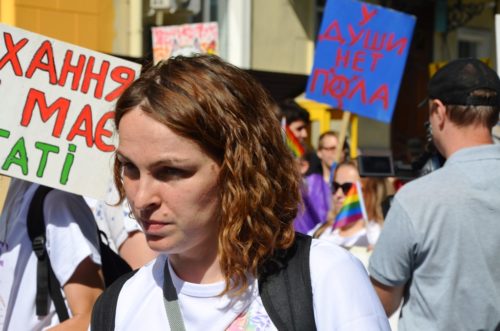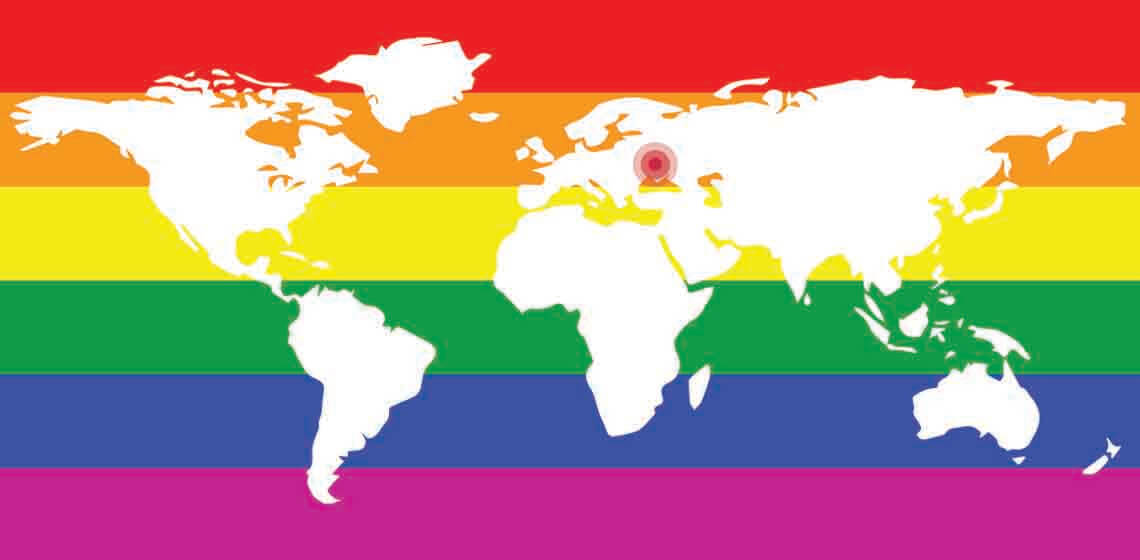Preparing for October, the coming-out month all around the world, let us hear Olena telling us about Ukraine, where coming out is still a very dangerous and not always advisable choice to make. Let us hear how and why she did it still.
Can you introduce yourself please?
My name is Olena Hanich. I am an LGBTQ+ activist from Ukraine. Since 2015 I’ve been working for a public organization “Gay-Alliance Ukraine” and since 2016 I am a member of the Odessa Pride Organizing Committee (given that Odessa is my home city). Standing openly for LGBTQ+ rights and changing situation for LGBTQ+ in Ukraine for better is an important part of my life.

How would you summarize the general situation of the LGBTQ+ community in your country?
Ukraine remains a very homophobic country; nevertheless, the situation for LGBTQ+ people has improved much recently. In 2012-2013, young anti-LGBTQ+ groups, which are most usually ultra-right-wing political supporters, openly promoted violence against LGBTQ+ people. That was the period when the term “gay safari” emerged and started being used very often. At the moment, I would not say there is a mass “gay/lesbian hunting,” but a societal homophobia is still very high. For instance, as a rule, a lesbian cannot openly display a picture of her partner at a workplace, as this is unsafe. The risk of being ostracized by colleagues is high enough. It’s difficult for me to imagine a situation of coming out as a lesbian at a university and getting formal support. Of course, I know some exceptions but they sound rather as an unusual success stories to me.
Ukraine has not adopted any draft law regarding the legalization of same-sex marriages, civil partnerships, or the criminal prosecution of hate crimes towards LGBTQ+. Only one single mention of sexual orientation and gender identity can we find in the Ukrainian framework, and that’s in Labor Law. What this means is that the workspace is the exclusive area of protection for me as a lesbian in Ukraine, and for non-heterosexual men. At the same time, it is still usual that lesbians or gays get fired, after their coming-out or an outing, but the official reason will be not their sexuality. This legal gap, concerning anti-discriminatory frameworks, leads to precarity and even invisibility in clearly discriminatory cases or hate crimes, based on homophobia and transphobia.

What’s the situation in Odessa, your city?
Last month we conducted the 4th Queer culture festival “Odessa Pride,” which concluded a Pride March. Odessa Pride is a good indicator for me to track the dynamics of social and political changes, regarding LGBTQ+ issues in my city. The very first Odessa Pride event took place in 2015, where I and other participants faced a range of counteractions – Odessa City Council had appealed to the Court. The Pride March was banned, hotels refused to accept coming guests from at the very last minute, landlords who we agreed on terms of rentals with refused to cooperate after receiving anonymous threats, and so on.
This year I should admit the police did a very good job. They effectively ensured the safety of Pride events and participants. As one of the organizers, I should also compliment the local authorities for being open for a dialogue with us, organizers. I also noticed less threat coming from right-wing radicals, namely fewer representatives protested against the march. All these changes are meaningful for me; however, this is still not enough to claim Odessa to be open for the LGBTQ+. I observe more openness from officials, providing a support to human rights and LGBTQ+ issues, still, the society is less flexible so far. Last year two friends of mine had to emigrate because the police refused to investigate attacks on them, even if they kept receiving further threats.

Can you say a couple of words about lesbian* social life in Odessa?
There is a lack of safe spaces for the LGBTQ+ in Odessa and other parts of Ukraine as well. We can’t feel free but have to hide constantly. This September “Gay-Alliance Ukraine” opened an LGBTQ+ community center, “Queer Home.” It aims to provide more possibilities for communication, socialization, self-development and personal growth for lesbians and other non-normative people.
Odessa is a major tourist city in Southern Ukraine, sadly, it is oriented only on heterosexual people. There is only one gay club in Odessa, which is mostly focused on male audiences. Unfortunately, there is no specific place for lesbians. Some people might say that regular night clubs in Odessa are tolerant, but if I go there with my girlfriend, I will be either harassed or be unpleasantly examined by others’ oblique looks.
Finally, can you share a funny, memorable, or inspirational coming out stories of yours?
I came out when I was 30, and that was my conscious choice. Perhaps if I were 19 or lived in a more open and tolerant country, everything would be different. I do not have funny coming out stories. When I decided to come out, I realized that most of my social connections or friends would become my past. But I didn’t have any regrets about the decision I made because it gave me a possibility to feel free and happy. Moreover, I’ve got a great support from my parents, and that means a lot to me.

